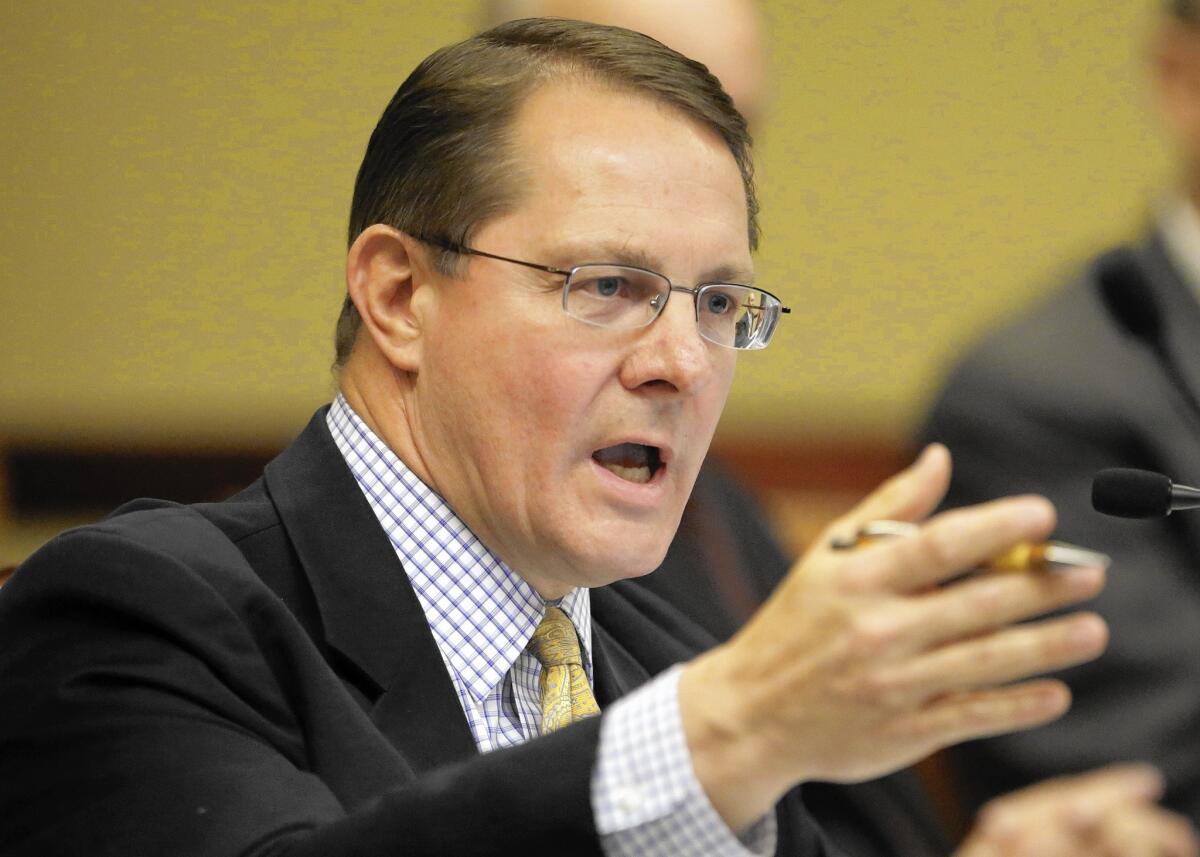Control of federal lands emerges as an issue in the GOP presidential race

Utah state Rep. Ken Ivory says transferring federal land to states would “solve so many of the major issues that face our nation.” Experts, however, are skeptical.
- Share via
If Ken Ivory could ask the Republican presidential hopefuls a question at their debate Wednesday night in Colorado, the state lawmaker from Utah would raise a subject that might seem arcane to much of the nation but no doubt would stir strong responses from the event’s Western audience.
First, Ivory would hold up a color-coded map showing the huge amount of land in the West — about 50% of the entire region, compared with a fraction of that in the East — owned by the federal government.
Then Ivory would hit the candidates with his radical proposal: Why not transfer control of most of that land to the states, which could clear the way for more hunting and fishing, more oil wells and coal mines and tree harvests, with all the economic benefits that surely would follow?
“Why shouldn’t the federal government have to treat all the states equally?” said Ivory, himself a Republican, who has been pitching his plan around the country through an advocacy group he founded, the American Lands Council. “If they were really serious about a solution big enough to solve so many of the major issues that face our nation — economic, environmental, national security, energy — this is the only solution.”
SIGN UP for the free Essential Politics newsletter >>
Rand Paul and Ted Cruz are among those who have strongly endorsed the idea, but other Republican candidates also have signaled varying degrees of sympathy for conservative voters in Colorado and beyond who are frustrated by what many say are excessively restrictive federal policies on public lands in the West.
It is hardly a new cry — and experts widely dismiss the notion as economically and environmentally implausible — but it appears to be getting louder.
At least 10 states in recent years have approved legislation that tries to claim federal land or explore the possibility of doing so, helping prompt the Republican National Committee last year to draft a “resolution in support of Western states taking back public lands.” Some Western Republicans, facing battles with the federal government over mining and water quality controls, have called for abolishing the Environmental Protection Agency.
Last week, Jeb Bush, a relative moderate in the current Republican field, outlined a federal lands policy he said would direct federal agencies to allow states to determine, “consistent with law,” land uses that are sustainable and locally compatible.
Sen. Marco Rubio (R-Fla.) released an energy policy this month pledging that his administration would “work with Congress to ensure that states and tribes — not the federal government — have the primary role in oversight of energy development within their borders.”
And Donald Trump, one of the GOP front-runners, has called for dismantling the EPA. “What they do is a disgrace,” Trump told Fox News. “Every week they come out with new regulations. They’re making it impossible.”
A report this week from the left-leaning Center for American Progress Action Fund found that seven GOP presidential candidates — Paul, Cruz, Rubio, Ben Carson, Carly Fiorina, Mike Huckabee and Rick Santorum — have expressed support for transferring or privatizing U.S. land and energy reserves.
In a campaign in which Nevada, Colorado, Utah and Arizona all hold early primaries, dropping such populist talking points into speeches to conservative audiences is not surprising. Whether the issue will endure is a different question.
“They may throw the red meat when they’re in the Western states, but you don’t see it resonate that often in the national elections,” said John Freemuth, a professor at Boise State University who specializes in public lands issues. Many people outside the region are unfamiliar with federal bureaucracies such as the Bureau of Land Management, a powerful overseer of grazing lands and mining claims for those in the West, Freemuth said.
“The further we move east,” he said, “the more confused people get about public lands.”
Yet even with no branded Western candidate among the front-runners in either party, people on various sides of public lands issues say they believe this election could be different. Broad questions over climate change, drought and domestic energy development — fossil fuels and renewables — connect directly to Western public lands policy, and they are likely to increase with a summit in Paris in December intended to establish international goals for reducing greenhouse gas emissions.
NEWSLETTER: Get the day’s top headlines from Times Editor Davan Maharaj >>
Specific battles continue as well, including the fate of Cliven Bundy, the Nevada rancher who came to an armed standoff against the government last year when the BLM tried to enforce grazing policies he has been defying for years.
Another point of contention: The refusal of Rep. Rob Bishop, a Utah Republican who leads the House Committee on Natural Resources, to allow a vote on renewal of the widely popular Land and Water Conservation Fund, which uses royalties from offshore oil and gas drilling to protect public land.
“I like lands, public lands that are actually controlled by people who live here,” Bishop told the Fox television affiliate in Salt Lake City recently. “I don’t like our public lands, our federal lands, to be controlled by somebody who lives in Washington.”
There are also fights over rules limiting hydraulic fracturing for oil and gas production on public land, royalties paid to the government by coal mining companies, and hunting restrictions in Alaska.
A poll of likely voters in Colorado and Nevada this month conducted by a bipartisan team commissioned by the Outdoor Industry Assn. found that 62% of voters in Colorado, including 54% of Republicans, agreed with the idea that transferring federal lands to state ownership could leave the state with insufficient funds to fight wildfires and, if auctioned off to private owners, jeopardize the ability of future generations to enjoy them.
Matt Lee-Ashley, who works on public lands issues at the Center for American Progress, said the group’s report found that some Republican candidates appeared to be speaking in coded language to convey to conservative donors that the energy industry would find it easier to extract fossil fuels from public lands under their administrations because the candidates, if elected, would transfer control of those lands to states.
“We’re seeing some of the presidential primary contenders use that issue as a dog whistle to the far right.”
MORE POLITICAL COVERAGE
Republican debate: Expect either Trump fireworks or a policy wonk’s dream
How will Donald Trump react to his slip in the polls?
Presidential debates have become must-watch television
More to Read
Sign up for Essential California
The most important California stories and recommendations in your inbox every morning.
You may occasionally receive promotional content from the Los Angeles Times.














